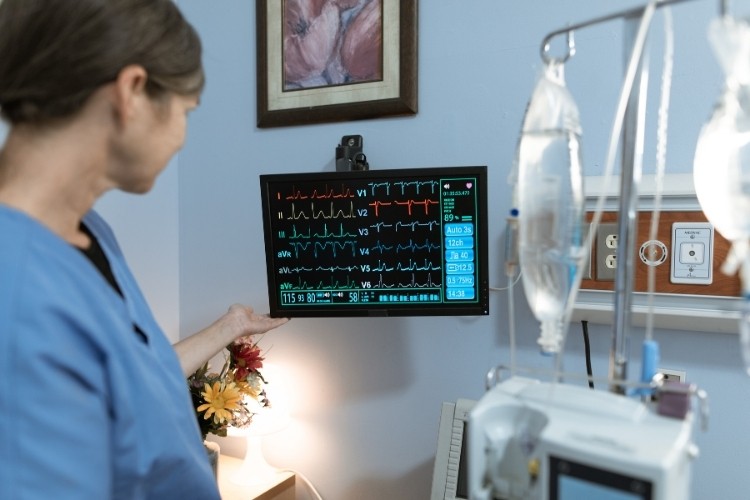Licensed Vocational Nurse (LVN)
Nursing Career Guide

Overview
What Is a Licensed Vocational Nurse (LVN)?
A Licensed Vocational Nurse (LVN), also known as a Practical Nurse (LPN) depending on the state, is a healthcare professional trained to provide basic nursing care under the supervision of a Registered Nurse (RN), Advanced Practice Registered Nurse (APRN), or physician. They are essential members of the healthcare team, assisting with daily living activities, monitoring vital signs, administering medications, and providing routine bedside care.
Vocational Nurses play a vital role in ensuring patient comfort and continuity of care across a wide range of healthcare settings. While they do not typically handle complex clinical decisions, their hands-on support is critical to patient recovery and quality of life. Many Vocational Nurses also help with patient education, medical charting, and communication between patients and the broader healthcare team.
In terms of career progression, the LVN role fits between the Nursing Assistant (CNA) and the Registered Nurse (RN). They often work alongside Nursing Assistants and other Licensed Vocational Nurses and may share similar responsibilities depending on the state. This role offers a strong foundation for those looking to advance their nursing career. Moving from an CNA to a LVN, and eventually to an RN, is a common path supported by bridge programs and additional education.
Education
How To Become a Licensed Vocational Nurse (LVN)
To become a Licensed Vocational Nurse, you must complete a state-approved vocational nursing program. These programs are typically offered at community colleges, vocational schools, and some hospitals. The curriculum includes both classroom instruction and hands-on clinical training in areas such as patient care, pharmacology, and health assessments. The relatively short training period makes vocational nursing an appealing option for those who want to quickly begin working in healthcare.
Follow these steps to become a Vocational Nurse:
- Complete a Vocational Nursing Program. Enroll in a state-approved vocational nursing program, typically offered at community colleges and technical schools. These programs usually last about 12 to 18 months.
- Gain Clinical Experience. During your program, complete supervised clinical rotations, where you will gain hands-on experience in a healthcare setting under the guidance of licensed professionals.
- Pass the NCLEX-PN Exam. After completing your educational program, you must pass the National Council Licensure Examination for Practical Nurses (NCLEX-PN) to obtain your license. Both the Licensed Vocational Nurse (LVN) and Licensed Practical Nurse (LPN) take the same NCLEX exam. There is no separate NCLEX-VN exam.
- Obtain State Licensure. Once you pass the NCLEX-PN, apply and pay the fee for licensure in your state. You may also need to complete additional steps, such as a background check or submit any required documentation.
- Maintain State Licensure. Most states require LVNs to renew their license every two years. This typically includes completing continuing education hours to stay current with nursing standards.
How long does it take to become a Licensed Vocational Nurse? On average, it takes between 12 and 18 months to complete a vocational nursing program. Afterward, you may need additional time to prepare for and pass the NCLEX-PN exam, which can add a few more months. In total, most individuals become licensed Vocational Nurses within 18 to 24 months.

Average Salary
How Much Does a Licensed Vocational Nurse Make?
Vocational Nurses earn a competitive salary, especially considering the relatively short time it takes to complete training. On average, a Vocational Nurse can expect to earn between $45,000 and $75,000 per year, depending on experience, location, and employer. Those working in high-demand areas or specialized care settings may earn more.
Average annual salary for a Licensed Vocational Nurse:
- Entry-level: $45,000 - $55,000 per year.
- Mid-career: $55,000 - $65,000 per year.
- Experienced: $65,000 - $75,000 per year.
The latest salary report from the U.S. Bureau of Labor Statistics (BLS) shows that the median annual wage for Licensed Vocational Nurses is $59,030. The average hourly wage is $28.38. Wages range from $20.40 per hour for the lowest 10% to $35.59 per hour for the highest 10%. This equates to a full-time salary range of approximately $42,000 to $74,000 per year. Those employed in outpatient care or government agencies often earn more, while geriatric care and long-term care settings tend to pay less on average.
Vocational Nurses have excellent opportunities for career and salary growth. As an entry-level licensed nursing role, the LVN gains essential real-world experience while earning a stable income. With time, many Vocational Nurses pursue higher credentials, such as becoming a Registered Nurse. LVN to RN bridge programs offer a flexible path for career advancement while continuing to work.
Job Duties
What Does a Vocational Nurse Do?
Vocational Nurses are responsible for providing routine patient care and supporting the medical team in various healthcare settings. Their scope of practice is often defined by state regulations, but their primary focus is on ensuring patient comfort and assisting with basic medical needs. The job duties of a Vocational Nurse require attention to detail and compassion for patients, as they are responsible for a significant portion of direct patient care.
The most common job duties of a Vocational Nurse:
- Monitoring Vital Signs. Vocational Nurses regularly check patients' vital signs, such as blood pressure, heart rate, and temperature, to ensure their health status is stable.
- Administering Medications. Under the supervision of an RN or doctor, LVN are responsible for administering medications, ensuring the correct dosage, and observing for any side effects.
- Providing Wound Care. Vocational Nurse assist with dressing wounds, monitoring for infection, and ensuring proper healing through routine care.
- Assisting with Daily Living Activities. LVN help patients with tasks like bathing, dressing, and feeding, particularly in long-term care or home health environments.
- Documenting Patient Care. LVN maintain accurate patient records, documenting vital signs, treatments, and any changes in a patient's condition to keep the healthcare team informed.
- Additional Duties. Vocational Nurse working at a hospital or nursing home may also insert catheters, monitor catheters, give enemas and injections, collect samples, and perform laboratory tests.
Vocational nurses often stand for long periods of time. A 40-hour work week is typical, however, shifts at facilities that require 24-hour care may be split into morning, day, and night, with the frequent need to fill weekends and holidays. Medical environment hazards include the presence of disease, the use of chemicals, injections, possible radiation exposure, and injury if providing direct patient care to patients who are confused or uncooperative. During times of patient overload at a hospital, for example, workload related stress can also be present for a Vocational Nurse.

Essential Skills
What Skills Does a Vocational Nurse Need?
Vocational Nurses must be detail-oriented and comfortable performing routine nursing care under supervision. They need strong communication skills, clinical attention, and a calm approach when supporting patients and discussing care plans with families. Here are some of the skills a Vocational Nurse needs to succeed:
- Clinical accuracy. Administer medications, take vital signs, and assist with wound care.
- Patient communication. Provide updates to patients and families and discuss care instructions clearly and calmly.
- Flexibility. Adjust to changing shift needs, patient assignments, or care routines in long-term or hospital settings.
- Record keeping. Chart patient care activities, symptoms, and responses using paper or digital medical records.
- Teamwork. Coordinate with RN, NA, and doctors to deliver consistent care across a shared patient load.
- Ethical judgment. Maintain professional standards, protect patient confidentiality, and report health or safety concerns.
Work schedules may include overnight shifts or extended hours, depending on the facility. Vocational Nurses often balance large patient loads, which can be physically and emotionally taxing over time. Stamina, focus, and the ability to reset between shifts are important traits for long-term success in this role.
Work Environment
Where Does a Vocational Nurse Work?
Vocational Nurses work in a wide variety of healthcare settings, offering flexible employment opportunities based on patient needs and personal career goals. The most common workplaces for a Vocational Nurse include:
- Hospitals. LVN provide basic patient care, assist with treatments, and monitor patients in hospital settings. They often work alongside RN and doctors in departments like general medical-surgical wards, labor and delivery, and rehabilitation units.
- Nursing Homes. Many LVN work in nursing homes, where they care for elderly or disabled patients who require long-term care. They assist with daily living activities, administer medications, and monitor residents' health conditions.
- Clinics. Vocational Nurses in outpatient clinics assist doctors with routine medical procedures, patient education, and minor treatments. These positions offer a more predictable work schedule compared to hospitals.
- Home Health Care. LVN may provide care for patients in their homes, particularly for individuals recovering from surgery or managing chronic illnesses. This role involves personal care, medication administration, and patient education.
A few of the well-known hospital departments where Vocational Nurse and other nurses work are the Emergency Room (ER), Intensive Care Unit (ICU), Cardiac Care Unit (CCU), Obstetrics & Gynecology, Operating Room (OR), and Outpatient. Vocational Nurses can adapt to a range of work environments, from fast-paced hospitals to the more personalized care found in home health settings, offering a variety of work experiences.
Last updated: August 22, 2025
References:
- Practical and Vocational Nurses. Bureau of Labor Statistics, U.S. Department of Labor. Occupational Outlook Handbook. Retrieved August 22, 2025.
- NCLEX Nurse Licensure Exam. National Council of State Boards of Nursing (NCSBN). Retrieved August 22, 2025.
- Vocational Nurse. Texas Board of Nursing, Licensing and Renewals. Retrieved August 22, 2025.
- Vocational Nurse Job Description: Top Duties and Qualifications. Indeed for Employers. Retrieved August 22, 2025.
- Vocational Nurse Salary in the United States. Salary.com. Retrieved August 22, 2025.
- Career Profile: Practical Nursing. Cambridge College of Healthcare and Technology. Retrieved August 22, 2025.
- What are some careers in health science?. CareerOneStop, U.S. Department of Labor, Employment and Training Administration. Retrieved August 22, 2025.
- Vocational Nurse Job Description. Southern California Health Institute, Career Profile. Retrieved August 22, 2025.
- Occupation Profile. State of California, Employment Development Department, Career Profile. Retrieved August 22, 2025.


